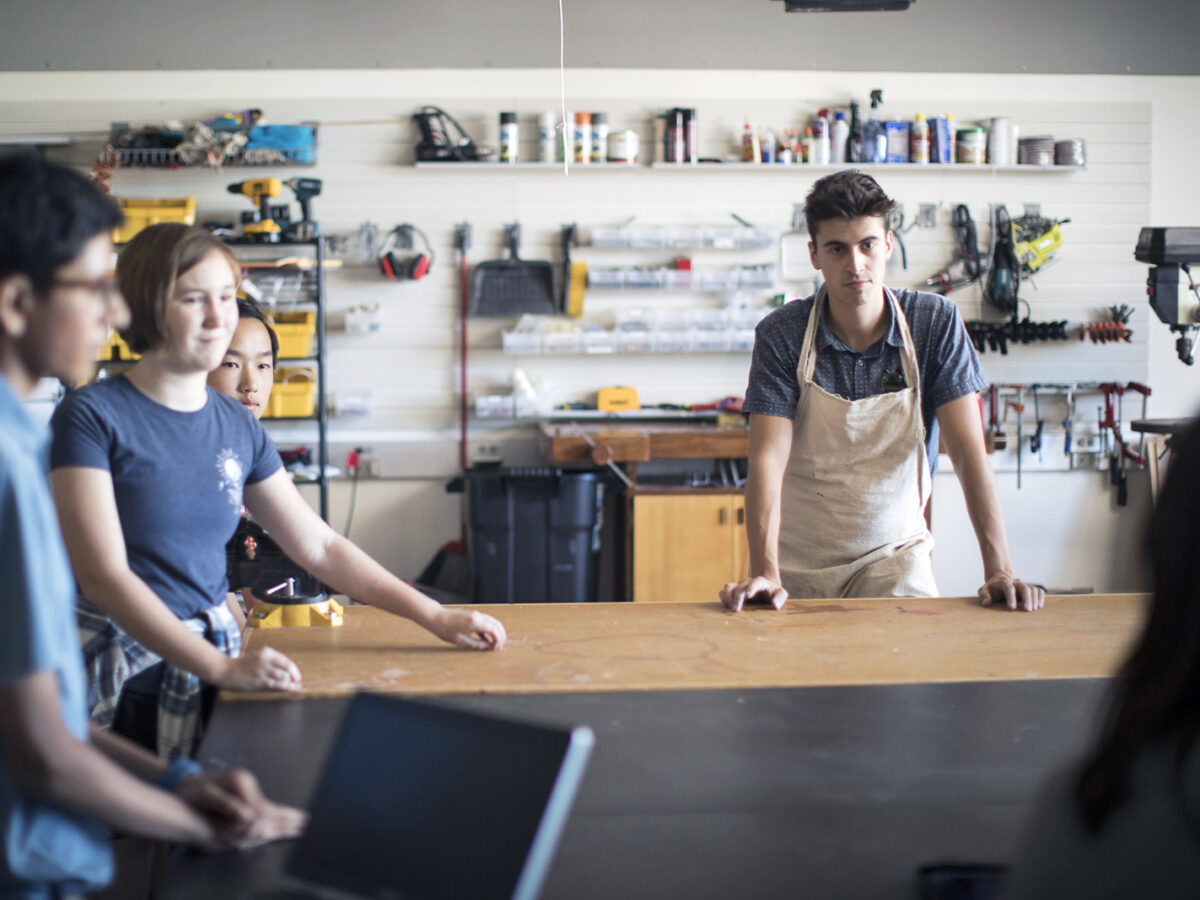Nico Gallo: Kind by design

Walk into the Design Lab in the physics wing of Phelps Science Center and you’ll hear a distinct buzz — part mechanical noise, part chatter, frequently punctuated by laughter and excited sounds of discovery. The students are eagerly using their hands as they figure out how to build everything from wooden objects to robots and architectural models.
On hand to help is Nico Gallo, the Design Lab coordinator, who brings to his task a background in mechanical engineering and design, and a great appreciation for what can be learned with healthy doses of trial and error.
“I try not to answer every question that students ask — partly because I don’t know all the answers, and partly because I want students to be able to work with questions,” says Gallo.
Seeing the big picture
“It’s easy to get lost in a room full of tools and materials, and say, ‘Well, I don’t know any of this,’” Gallo says. “I try to guide the students through the process of specifying their goals and the information, or skills, that they need to solve a problem.” Gallo focuses on teaching how to quickly research unfamiliar topics or challenges.
He admits he wanted to be knowledgeable about everything when he started at the lab in 2017, but acknowledges that his background in Computer-Aided Design and woodworking left him not entirely prepared for the breadth of student projects, which can range from architecture to robotics and footwear design. Helping students approach these challenges means that Gallo is constantly learning too.
“I’ll adopt an air of curiosity and say, ‘That’s a great problem. What do you think?’” he says. “I encourage guessing if a student has never used a tool before, and say, ‘Well, take a look at it. How do you think this tool works?’ They usually have a pretty intuitive understanding of it. Through those kinds of prompts, and my selectively withholding information, students start to develop self-confidence about finding answers for themselves. I think that’s the most important thing that we teach in the Design Lab.”
The lab, which is funded by an Aileen and John Hessel Innovation grant, is open roughly 12 hours a week to students, faculty, classes and student organizations. One such group is the FIRST (For Inspiration and Recognition of Science and Technology) Tech Challenge robotics team; Gallo serves as the adviser. The FIRST Tech Challenge prompts students worldwide to design and build robots that accomplish tasks on a 12-by-12-foot field full of game pieces, obstacles and other robots. This year, PEA’s 12-member FTC team constructed and programmed a robot to compete in a game which simulates challenges that a lunar rover might encounter. Their robot is about the size of a small dog. It can drive forward, backward and side-to-side without having to turn; and uses computer “vision” to sort game pieces of different colors without human control. The PEA team will compete with this robot in a series of tournaments from December through early spring of 2019.

Exeter’s FTC team has also developed a community outreach plan which includes events such as a STEM day with guest speakers; mentorship of a middle-school FIRST team; and robot demonstrations at groups including Seacoast Outright, a support and advocacy organization for local LGBTQIA+ youth. They are also planning to prototype a semi-autonomous robot to help students with sports injuries by carrying their backpacks and other equipment around campus, including up stairs.
Building for class, building for fun
Gallo earned a degree in mechanical engineering at the University of New Hampshire, where he worked on interdisciplinary projects that crossed boundaries among math, sculpture, programming, music and visual arts. He maintains a studio in the Port City Makerspace, where he and a partner create products for industrial, commercial and artistic communities under the name Portsmouth Industrial Design. He plays the vibraphone and other mallet percussion instruments, and in the Design Lab, he often works on his own projects, which include making and modifying musical instruments.
“It’s really good for the students to see faculty engagement and a presence in the space that opens their eyes to what they can do,” says Gallo. He encourages teachers to come, with their classes or alone. Gallo is excited by the work of Computer Science Instructor Sean Campbell, who is constructing a synthesizer, and the students in Religion Instructor Nuri Friedlander’s Islam course, who have worked in the Design Lab two years in a row with an assignment to make any critical object related to the teachings of Islam.
Equal parts electronics lab, woodshop and digital design studio, the lab’s equipment includes 3D printers, a laser cutter, hand tools, and supplies that run the gamut from duct tape to gears. Space can be at a premium, and students often request additional tools, such as a table saw, which, in addition to bulk, would add too much dust to the lab’s classroom home to be practical. Gallo hopes to be able to use the state-of-the-art Goel Center scene shop as an annex to the lab for complex projects, and plans to offer student field trips to Port City Makerspace in the near future.
It was Gallo’s own time in collaborative makerspaces that helped him grasp how best to learn. He’d ask those around him for help sorting out a problem and they would provide what information they had, telling him to look up the rest on YouTube, reminding him he probably wasn’t the only one to ever face that issue. It’s a question Gallo now poses to students: Are you the first person to have this problem? He then directs them to research online. Though it’s hard to believe today’s students would need to be encouraged to head to Google, Gallo says the act of making things is new to many, and they approach it differently than they do their classroom studies.
— Sarah Zobel